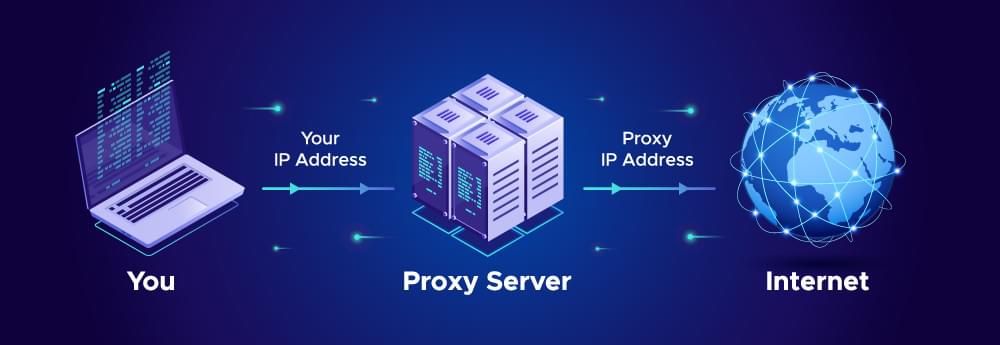In an era where every click, search, and scroll leaves a digital trail, hiding your IP address is a necessity. By 2026, the stakes have never been higher. From cyber criminals deploying sophisticated attacks to governments tightening surveillance, your online identity is constantly under threat.
Hiding your IP address does more than keep you anonymous. It guards your data, stops unwanted tracking, and gives you access to content blocked in your area. You should get around geo-blocks, keep sensitive info safe, or avoid higher prices when booking flights. IP masking is your best defense for all of these.
You have several good options to hide your IP address. VPNs create encrypted tunnels to protect your connection, while proxies act as go-betweens that mask your actual location.
This guide will show you why hiding your IP matters in 2026, the top ways to do it, and how to stay safe from new online privacy risks.
Why Hide Your IP Address?
In 2026, the internet is more connected and more at risk—than ever before. Your IP address, which identifies you online, can tell others a lot: where you are, what sites you visit, and even personal details. Here’s why you should hide it:
To Keep Your Information Private
Your ISP, advertisers, and even governments can see what you do online by looking at your IP address. They can watch and save everything from the sites you visit to the ads you click. When you hide your IP, you take back control of your online footprint. This keeps your browsing history private and safe from snoopers.
Data Security
Online threats have gotten more complex. Hackers always look for weak spots to attack. Your IP address is a primary target for DDoS attacks, phishing tricks, and data theft. Implementing a PAM solution alongside IP masking can further strengthen security by managing access permissions and reducing vulnerabilities. When you hide your IP, you lower your chances of being a target for cyber criminals. This adds another layer of protection to your online tasks.
Get Around Location Blocks
Have you ever felt annoyed by seeing “This content isn’t available where you are” pop up? Many streaming platforms, websites, and services limit access based on where you’re located. Masking your IP lets you dodge these location blocks, giving you the freedom to access content from any part of the world. If you’re traveling and need a reliable way to stay connected without dealing with restrictions, using an eSIM can help you access local networks seamlessly while keeping your online activity private.
To Avoid Price Discrimination
Online stores, airlines, and travel sites often check your IP address to figure out where you are—and change prices based on that. This method called dynamic pricing, can make things cost more depending on your location. Hiding your IP lets you shop and book trips without facing unfair price changes, which could save you a lot of money.
Best Ways to Hide IP Address in 2026
As more people worry about privacy, it’s easier than ever to hide your IP address. Here are the most valuable methods to protect who you are online in 2026:
Using a Proxy Server
A proxy server stands between your device and the internet. When you connect, your requests go through the proxy hiding your actual IP address.
Best for:
- Web scraping and data collection
- Quick access to geo-blocked websites

Using a VPN (Virtual Private Network)
A VPN encrypts your internet connection and sends it through a secure server in a place you pick. This hides your IP address and makes it look like you’re browsing from somewhere else.
Best for:
- Keeping your online activity private and secure
- Watching geo-blocked content on streaming sites
- Keeping your data safe on public Wi-Fi
Connect via Mobile Networks
Switching from Wi-Fi to mobile data changes your IP address for a short time, giving you a fast way to hide it. Just turning mobile data off and on can give you a new IP.
Best for:
- Fast short-term IP hiding when you need privacy for a short time
Limits:
- Data use often has limits compared to broadband links
- Not as safe as a VPN or Tor without encryption
Change IP Manually
You can change your IP address on your own by restarting your router (dynamic IP) or setting up your network (static IP). Most ISPs give out dynamic IP addresses that change each time you reset your router.
Best for:
- Quick fixes without extra tools or programs
Limits:
- Gives little privacy protection since ISPs can still see what you do
- Needs frequent manual resets to keep hiding your IP
Advanced Ways to Hide Your IP Address
People who want more privacy and control should go beyond basic IP hiding methods. Advanced techniques give stronger solutions, making sure you have more privacy and options. Here’s how you can get ahead when hiding your IP address:
Using a Dedicated Proxy with Rotating IPs
A dedicated proxy gives you a unique IP address, while rotating proxies change the IP every so often. This setup has an impact on your anonymity, as your IP keeps changing during web sessions. Smart AI Proxy is a solid choice that uses millions of home and data center proxies by adding a rotating gateway proxy.
Best for:
- Getting around anti-bot measures when scraping websites
- Handling several accounts on sites that flag IPs used more than once
- Better privacy for tasks involving data
Advantages:
- Keeps hiding your identity by switching between many IP addresses
- Lowers chances of getting your IP banned or blacklisted
Use Cloud-based Proxy
Cloud-based proxy services use big groups of IP addresses stored in data centers across the globe. They send your internet traffic through servers in the cloud giving flexible options for companies and people.
Works well for:
- Companies that need flexible ways to hide IPs for web automation
- Avoiding slowdowns and bans when trying to see blocked content
Benefits:
- Excellent uptime and the ability to grow are perfect for enterprises.
- Steady service with many IP addresses to pick from
Create Your Own VPN Server
How it works: Rather than using a VPN company, you can build your own private VPN server with cloud platforms like AWS, Azure, or DigitalOcean. This gives you total say over the VPN’s setup and makes sure no other companies are involved.
Best for:
- People who want complete control of their info and coding
- Tech-savvy folks who need unique setups for specific jobs
Use Decentralized VPNs (dVPNs)
How it works: Unlike regular VPNs, decentralized VPNs run on a peer-to-peer (P2P) network where users share bandwidth and resources to hide their IP addresses. This spread-out model boosts privacy by getting rid of central servers.
Best for:
- People who care about privacy and want to avoid central control
- Users who want more challenging, harder-to-censor networks
Legal and Ethical Considerations of Hiding IP Addresses
Hiding your IP address has a significant impact on boosting privacy and security, but you need to grasp the legal and ethical limits. IP masking is legal, but how you use it decides if it fits with the law and ethical norms.
Legal Uses of IP Masking:
- Protecting Privacy: You can use VPNs, proxies, or Tor to shield your data from hackers, ISPs, and snooping.
- Bypassing Geo-Restrictions: Watching region-locked content such as streaming services often falls into legal gray areas. While not a crime, it might break the terms of service.
- Remote Work Security: Many people working from home use VPNs to link up with company networks, which is accepted and legal.
Illegal Activities:
- Breaking the Law with cyber crime: IP masking to hack, spread malware, or do other illegal things can land you in jail.
- Using the Dark Web for Shady Stuff: Tor keeps you anonymous, but getting involved in illegal markets or activities is against the law.
- Pulling Off Scams: IP masking to trick people, like getting around bans or pretending to be someone else, breaks the law.
Content Rules and Service Terms
- Streaming Platforms and Region Locks: Getting around geo-restrictions might not break the law, but it can go against the rules set by Netflix or Hulu. It’s worth thinking about whether you’re okay with this.
- Web Scraping and Data Access: When you use proxies to scrape websites, make sure you follow their rules. Good scraping means you don’t overload the site or mess up how it works.
- Fair Use of Resources: Don’t use IP masking to get around bans or misuse services. This goes against fair use and can cause problems for other users.
Ethical IP Masking Practices:
- Use VPNs and proxies to protect your privacy, not to take advantage of or hurt others.
- Honor the online limits that service providers and websites put in place.
- Steer clear of actions that might harm platforms, services, or users.
Final Thoughts
In 2026, concealing your IP address is more than just a way to boost privacy—it’s a must in a digital world that’s more connected and watched than ever. Whether you’re guarding your data from nosy onlookers getting to worldwide content or keeping sensitive info safe, hiding your IP gives you the power to stay in charge of your web scraping. The most secure and widespread ways to mask an IP address are using a proxy server or a VPN.
Smart AI Proxy provides rotating proxies that businesses can rely on to get to blocked content in different regions. You can reach out to us now to boost your online privacy. Sign up and get 5,000 free Smart AI Proxy credits!
Frequently Asked Questions (FAQs)
Is it illegal to hide my IP address?
No, it is generally not illegal to hide your IP address. Most people use tools like VPNs and proxies to protect their privacy, secure their data, or access region-locked content. However, using these tools for illegal activities—such as hacking, fraud, or other cyber crimes can result in legal consequences. Always use IP masking responsibly and within the bounds of the law.
Can I hide my IP address for free?
Yes, you can hide your IP address for free using services like free VPNs, proxies, or the Tor network. However, free options often come with significant drawbacks, such as slower speeds, limited features, data logging, or weaker security. For better privacy and performance, consider investing in a reputable paid service.
How do proxies differ from VPNs?
While both proxies and VPNs hide your IP address, they function differently:
- Proxies act as intermediaries, routing your internet traffic through a different server but without encryption. They’re helpful for tasks like web scraping or bypassing simple geo-restrictions.
- VPNs encrypt your entire internet connection, providing both IP masking and data protection. They are better suited for security-conscious users or those accessing sensitive information.
VPNs offer more robust privacy and security compared to proxies.
Can websites still track me if I hide my IP address?
Hiding your IP address reduces the ability of websites to track you, but it doesn’t make you completely invisible. Websites can still use other tracking methods, such as:
- Cookies: Small files stored on your device that track browsing behavior.
- Browser Fingerprinting: Collecting information about your device, browser, and settings to create a unique profile.
- Tracking Pixels: Invisible images that monitor user activity.












